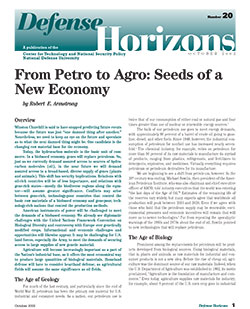Overview
 Winston Churchill is said to have stopped predicting future events because the future was just “one damned thing after another.” Nonetheless, we need to keep an eye on the future and speculate as to what the next damned thing might be. One candidate is the changing raw material base for the economy.
Winston Churchill is said to have stopped predicting future events because the future was just “one damned thing after another.” Nonetheless, we need to keep an eye on the future and speculate as to what the next damned thing might be. One candidate is the changing raw material base for the economy.
Today, the hydrocarbon molecule is the basic unit of commerce. In a biobased economy, genes will replace petroleum. So, just as we currently demand assured access to sources of hydrocarbon molecules (oil), in the near future we will demand assured access to a broad-based, diverse supply of genes (plants and animals). This shift has security implications. Relations with oil-rich countries will be of less importance, and relations with gene-rich states—mostly the biodiverse regions along the equator— will assume greater significance. Conflicts may arise between gene-rich, technology-poor countries that control the basic raw materials of a biobased economy and gene-poor, technology-rich nations that control the production methods.
American instruments of power will be challenged to meet the demands of a biobased economy. We already see diplomatic challenges with the United Nations Framework Convention on Biological Diversity and controversy with Europe over genetically modified crops. Informational and economic challenges and opportunities will likewise appear. It may be challenging for U.S. land forces, especially the Army, to meet the demands of securing access to large supplies of new genetic material.
Agriculture will become increasingly important as a part of the Nation’s industrial base, as it offers the most economical way to produce large quantities of biological materials. Homeland defense will have to consider heartland defense, as agricultural fields will assume the same significance as oil fields.
READ MORE >>